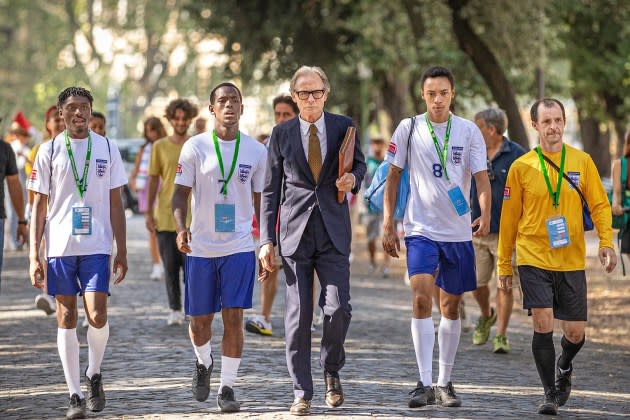‘The Beautiful Game’ Review: Bill Nighy Gives Micheal Ward a Sporting Chance in a Spirited Soccer Drama

An assortment of familiar life-as-sport metaphors get a healthy workout in “The Beautiful Game,” a story of underdog athletes for whom winning may not be everything, though it’s a welcome distraction from greater obstacles. For many viewers, Thea Sharrock’s cheery Netflix entertainment may serve as an introduction to the real-life event on which it’s based: the Homeless World Cup, an annual soccer tournament bringing together displaced or dispossessed players from nearly 50 countries, playing not merely for a trophy but for a second shot at life. As a premise for an inspirational sports drama, that’s close to unbeatable, and no amount of rote writing in Frank Cottrell-Boyce’s patchy script can dim the film’s lump-in-the-throat effectiveness.
Though drawn from the stories of a range of Homeless World Cup players, the film ultimately centers a single team — England, of course — from the event’s international tapestry, and rests on a couple of stock sports-drama figures. Bill Nighy is the impassioned, never-say-die coach keeping his men on track even as morale flags, Micheal Ward the gifted hothead yet to learn the value of team spirit. Others — a recovering addict playing for personal redemption, a determined young woman dreaming of the big leagues, a wily South African coach scraping through the competition on a wing and a prayer — provide additional incident in a somewhat overlong two-hour feature, though the characterization never goes so deep as to compromise the film’s feelgood messaging. For most of its participants, the tournament is a respite from harsher realities. “The Beautiful Game” depicts it in that spirit, from the broadness of its culture-clash comedy to the brightness of Mike Eley’s high-summer lensing.
More from Variety
An introductory roar of stadium crowd noise and fast-talking match commentary is soon shrunk to the inner monologue of Vinny (Ward), a fleet-footed young man crashing a children’s soccer match in an East London park. As aggrieved parents protest his goal-scoring intrusion, veteran coach Mal (Nighy) looks on approvingly. He knows a good striker when he sees one, even on altogether the wrong pitch. A legendary former kingmaker for West Ham United, he has turned his attention after retirement to assembling England’s Homeless World Cup team: a ragtag bunch of hard-luck cases with enthusiasm to spare, but nothing like Vinny’s raw talent.
An unemployed loner who has been living out of his car since his divorce, Vinny doesn’t initially take kindly to Mal’s recruitment plea — though the offer of an all-expenses-paid trip to sunny Rome, where the tournament is to take place weeks hence, eventually burns through his frosty resistance. The newcomer’s fancy footwork may give England more of a chance than they had before, but the team is slow to bond: There’s immediate friction between Vinny and demoted striker Cal (Kit Young), and while plucky, sensitive ex-junkie Nathan (Callum Scott Howells) is keener to make friends, Vinny’s haughty rejection sends him spiraling. The team gets a stroke of luck in the early rounds, earning a bye when tournament favorites South Africa see their arrival delayed by passport issues, though there’s no prize for guessing that sportsmanship will trump gamesmanship in the long run.
Cottrell-Boyce’s script crams in more subplots and topical issues than it can meaningfully develop. Nathan’s addiction troubles make for a reasonably affecting arc, but the travails of the other team members — including Syrian asylum seeker Aldar (Robin Nazari) and would-be ladies’ man Jason (Sheyi Cole), given a sharp #MeToo education when he inappropriately comes onto sparky Mexican-American player Rosita (Cristina Rodio) — are given very short shrift. As South Africa’s bolshy nun-turned-coach, Susan Wokoma provides amiable comic relief; the woes of the hopeless Japanese team and their dourly militaristic coach make for a less successful diversion, reliant on some outdated stereotyping.
A perhaps disproportionate amount of screen time is given over to Vinny’s hostile mood swings, as he repeatedly abandons his teammates, only to reconcile with them once again over common personal ground. At least one dramatic cycle of this routine could have been cut at no cost to the film’s narrative flow, though one can hardly blame “The Beautiful Game” for fixing its focus so insistently on Ward, whose volatile charisma quickens and complicates even a relatively thin character, and whose darting, restless screen energy pleasingly complements Nighy’s signature laid-back roguishness. (Nighy has twinkly chemistry, too, with an underused Valeria Golino as the Italian tournament coordinator, though the script keeps any whisper of romance between them on the back burner.)
Even when you can practically hear the film’s formulaic gear-shifting, it’s hard not to be won over, not least by the real-life backstory guiding its less authentic fiction. Fresh from “Wicked Little Letters,” theater director Sharrock steers proceedings in unfussy, audience-minded fashion, but cranks up the emotional machinery exactly when she needs to: Those who can remain dry-eyed through a final-match montage set to Aretha Franklin’s mighty cover of “Bridge Over Troubled Water” are not viewers whom “The Beautiful Game” has any intention of reaching.
“The Beautiful Game” opens in the U.K. on March 22. It streams in the U.S. on Netflix starting March 29.
Best of Variety
Sign up for Variety’s Newsletter. For the latest news, follow us on Facebook, Twitter, and Instagram.
